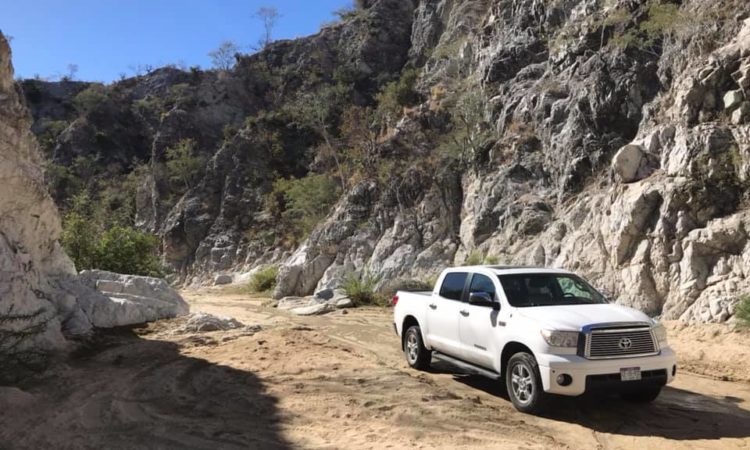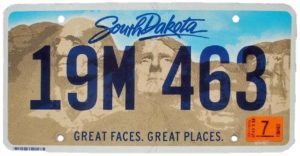Vehicles & Insurance in Los Cabos
When relocating to Los Cabos, people ask us so many questions about vehicles. What to do with your cars at home? How do you buy a car here? What about license plates? What’s up with all those South Dakota plates? Will I need special insurance if I bring a vehicle from home? We will answer them here as well as many more. This part of our blog is by no means fully comprehensive. Do your research based on your specific circumstances.
Foreign Plated Vehicles in the Baja
The entire Baja peninsula is considered a “Free Zone” for foreign plated vehicles. The Free Zone means you do not need a temporary import permit for your vehicle. However, your vehicle must have valid and current US or Canadian license plates with updated tags from the state of origin. Many Baja residents leave their US or Canadian plated cars in the Baja and have the plates and tags mailed to them or pick them up at a family member’s address at home. For more about the free zones and taking your foreign-plated vehicle out of the free zone, check out the blog “Driving in Mexico” at mexperience.com
Residency & Vehicles
Residency and vehicle ownership are linked. All residents (Residente Permanente) must drive locally plated vehicles and have local driver’s licenses. Many permanent residents will drive the US or Canadian plated cars at their peril. If you choose to do this, you will need to carry your US or Canadian driver’s license with you in case you are pulled over. Many permanent residents in Cabo drive their US or Canadian vehicles without concern.
If you are a temporary resident (Residente Temporal) you may go either way by having a locally plated vehicle or a US or Canadian plated vehicle. However, you must first have your local driver’s license to obtain and plate a local car.
 Insurance
Insurance
In Mexico, there is no requirement that drivers carry insurance. You should probably have it for everyone regardless of where your vehicle is plated. Insurance from the US or Canada will not cover you in Mexico. You will need to get insurance locally, even for your US or Canadian plated vehicle. Insurance you buy here will also come with coverage for the other cars you are in a collision with who do not have insurance. When bringing a vehicle to the Baja from home, you must have your insurance coverage lined up when crossing the border. Check with your insurer about suspending coverage while the car is in the Baja at home.
Local Driver’s License
Getting a local driver’s license is straightforward. You show your license from home and present proof of your blood type. That’s right; your blood type is a requirement on your driver’s license to show first responders which type you are. Clever idea, right! The blood type test is ~100 pesos at many local labs. Once you have that in hand, you present it with your license and pay a fee, snap your photo, and voila, you have a BCS driver’s license. Now you can buy and register a local vehicle.
If your Spanish is good, you should be able to do this independently. Otherwise, plenty of local resources can help you obtain your local driver’s license.
Start with bringing a vehicle from home
The logistics may seem daunting to get your residency, then a driver’s license, and then a vehicle and plates. We often tell people if they have a good reliable older SUV at home to bring it. You’ll have wheels right away while you get the driver’s licenses sorted out and acquire and plate a local vehicle. You can go on plates from home for a long time if you come from a state or province that doesn’t require regular emissions re-certifications or safety inspections. Eventually, you can later sell the vehicle you brought from home on Craigslist or Facebook Marketplace. A person like you is coming to Cabo who needs wheels and hasn’t gone through the residency yet.
Don’t want to drive that vehicle down the Baja? Plenty of folks have a business of transporting cars to and from Los Cabos. Ask us, and we can give you a few people to talk to.
Alternately you can start by buying a US-plated vehicle in Cabo instead of bringing one. Look for ones that have SD or South Dakota plates noted in the advertisements.
Importing a vehicle
There are plenty of blogs and internet articles regarding importing a vehicle into Mexico so that it can be plated locally. It is expensive and requires you to hire an agent to facilitate the process, and you may end up staying at a hotel in Tijuana or another border city for up to a week while the process occurs. If this interests you, there are many resources in Cabo that can assist with importing a vehicle from out of the country.
South Dakota Plates
So, you’ve seen many South Dakota license plates around Cabo? What’s that all about? Turns out that South Dakota is the only state in the union that doesn’t care if you’re a resident there to plate a vehicle. South Dakota plates are the alternative to plating US-originated cars when you’re finished driving the car back to that home state for emissions testing or other routine re-certification. We are far from experts in the process. We know people do it, and there are resources in Cabo that can assist in obtaining plates and tags from the registry in South Dakota. For more about South Dakota plates and their history with Cabo, check out this story “Why there are so many cars in Mexico with license plates South Dakota”
Buying a US or Canadian originated vehicle
Buying a US or Canadian-originated vehicle in Cabo involves finding one, getting it checked out, and then making payment and title transfer as you would at home. Look for them on Craigslist or Facebook Marketplace. Several English-speaking local mechanics can help with the inspection and roadworthiness. One thing that Mexican mechanics are somewhat reluctant to do is road test a US or Canadian plated vehicle. It sounds terrible, but the local police see a Mexican behind the wheel of a US or Canadian plated vehicle, and the immediate assumption is that it’s been stolen. Something to think about that does help push you in the direction of a local car.
Buying a Mexican-originated vehicle
There are the usual new and used car operations here, along with a robust 2nd hand market facilitated by Craigslist and Facebook Marketplace. We recommend that all ex-pats enlist a local resource in your search for a vehicle. Title transfer in Mexico is more complicated than back home, and much of additional protocols are needed to prevent theft and fraudulent registration of stolen vehicles. For example, a Mexico-originated car must have the original purchase factura and chain of custody from the new owner to register the car.
There are some pleasant upsides to buying locally. Some manufacturers will sell into Mexico lower than in the US or Canada. Mercedes is one of them. We purchased a used 2014 GLK from the local dealer in 2016 for 430,000 pesos (~ USD 25k at the time) with 11,000km on it. We checked online in the US, and the exact vehicle was going for $40k. On the other hand, Jeeps are the same new in Mexico as they are at home. Jeeps are so desirable here that of all vehicles you could have here, they hold their value the best regardless of where you got them from or where you have them plated.
Local licenses and plates/tags
Keeping your local vehicle tagged yearly is straightforward, but we still prefer having our ‘DMV guy” help with the process. Everyone must get their new tags each year within the first three months. So each year, we all need to have our tags updated by March 31. Drivers’ licenses need to be updated every three years. Admin fees are small, 1,000 Pesos for a driver’s license renewal and 700 Pesos for each set of vehicle tags.
Read more about moving to Cabo in our handy Los Cabos Relocation Guide

 Insurance
Insurance
